(新课标) Unit 2 Section A 2a-2d 课件 (新目标英语七下 Unit 2 What time do you go to school?)
文档属性
| 名称 | (新课标) Unit 2 Section A 2a-2d 课件 (新目标英语七下 Unit 2 What time do you go to school?) |

|
|
| 格式 | pptx | ||
| 文件大小 | 10.9MB | ||
| 资源类型 | 试卷 | ||
| 版本资源 | 人教新目标(Go for it)版 | ||
| 科目 | 英语 | ||
| 更新时间 | 2024-06-09 21:02:38 | ||
图片预览


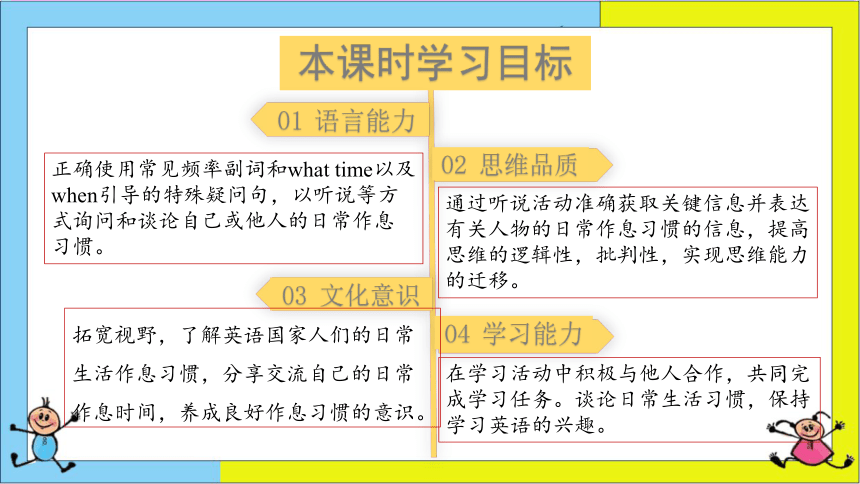
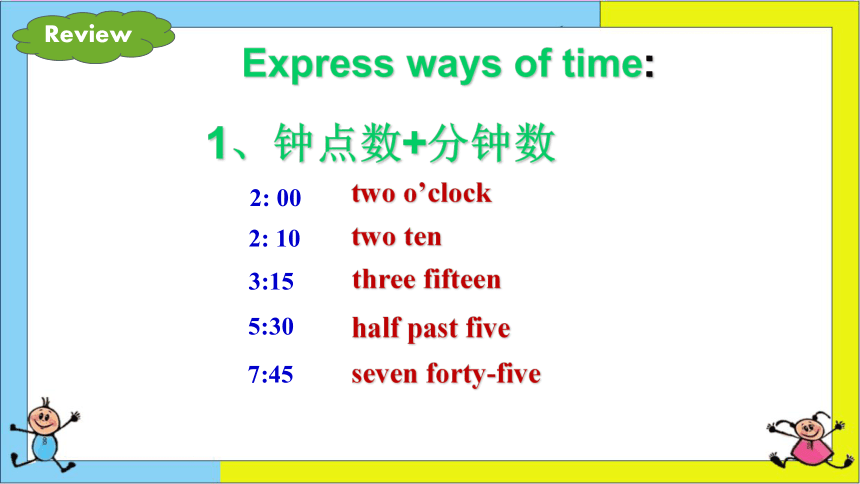
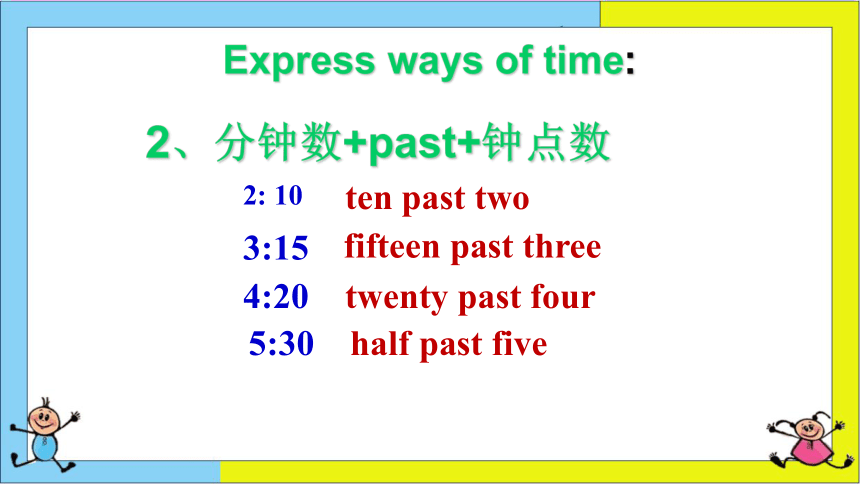
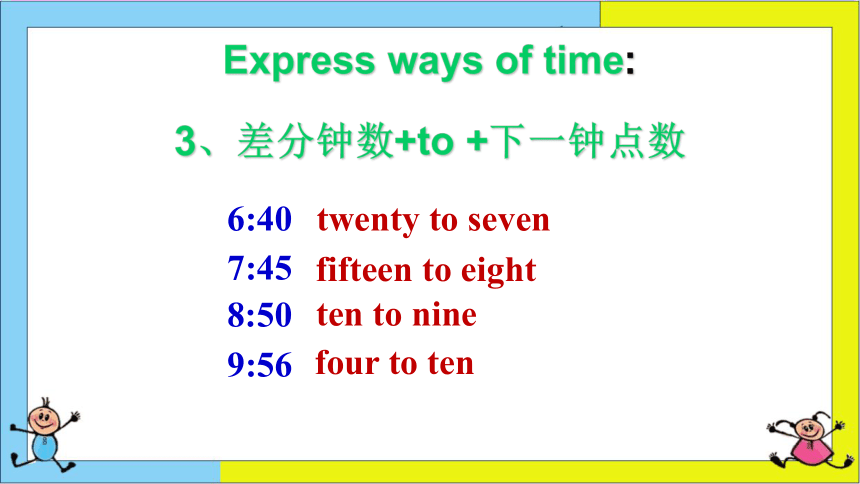
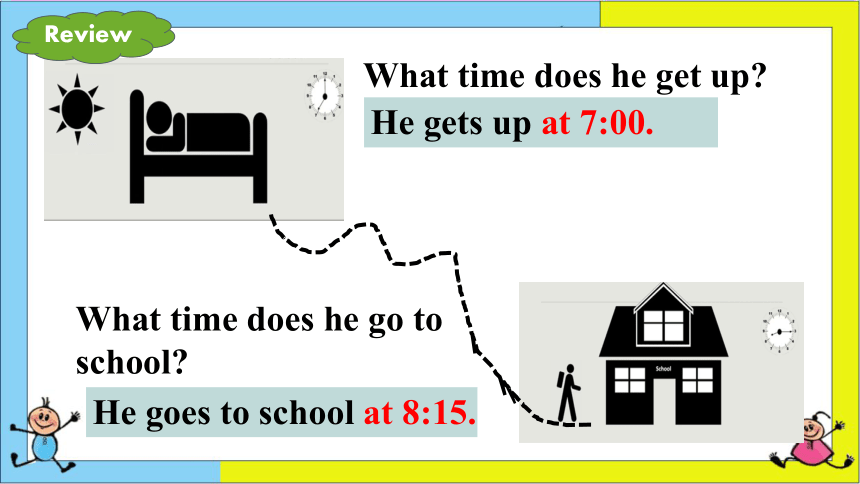
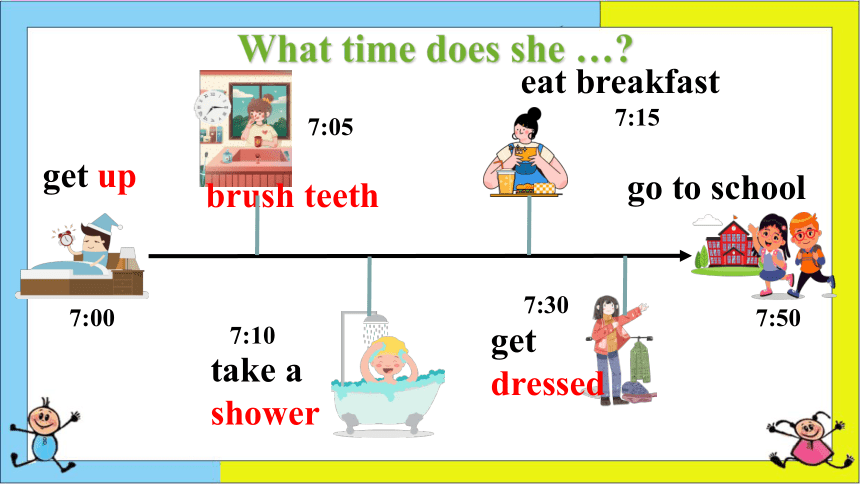


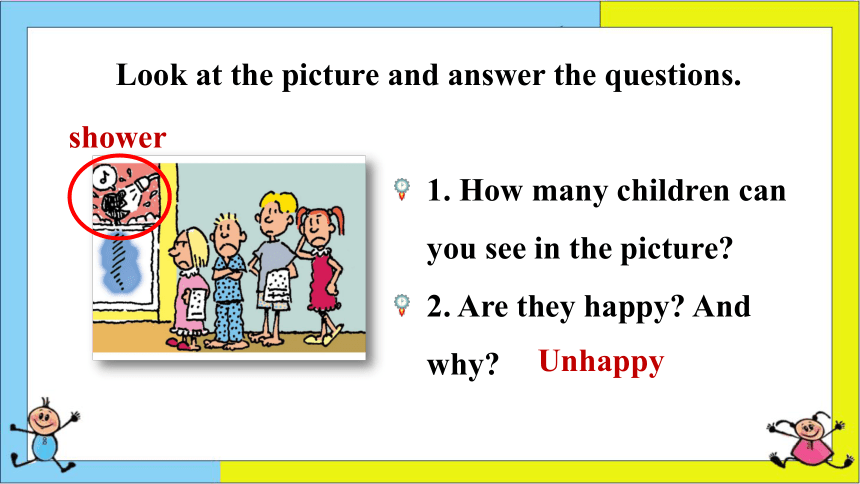
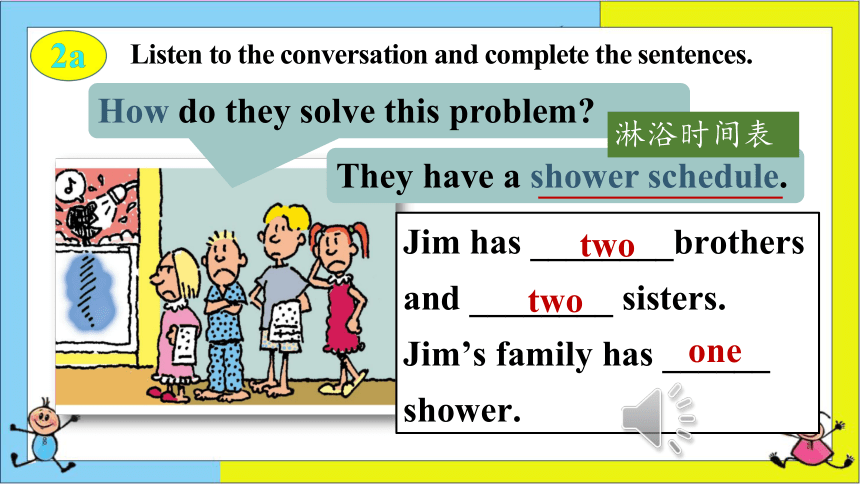
文档简介
(共33张PPT)
Section A
2a-2d
本课时学习目标
01 语言能力
02 思维品质
03 文化意识
04 学习能力
拓宽视野,了解英语国家人们的日常生活作息习惯,分享交流自己的日常作息时间,养成良好作息习惯的意识。
在学习活动中积极与他人合作,共同完成学习任务。谈论日常生活习惯,保持学习英语的兴趣。
正确使用常见频率副词和what time以及when引导的特殊疑问句,以听说等方式询问和谈论自己或他人的日常作息习惯。
通过听说活动准确获取关键信息并表达有关人物的日常作息习惯的信息,提高思维的逻辑性,批判性,实现思维能力的迁移。
Review
2: 10
3:15
5:30
7:45
two ten
three fifteen
half past five
seven forty-five
2: 00
two o’clock
1、钟点数+分钟数
Express ways of time:
2、分钟数+past+钟点数
2: 10
Express ways of time:
3:15
4:20
5:30
ten past two
fifteen past three
twenty past four
half past five
3、差分钟数+to +下一钟点数
Express ways of time:
6:40
7:45
8:50
9:56
twenty to seven
fifteen to eight
ten to nine
four to ten
What time does he get up
He gets up at 7:00.
What time does he go to school
He goes to school at 8:15.
Review
get up
take a shower
brush teeth
eat breakfast
get dressed
go to school
7:50
7:00
7:05
7:10
7:30
7:15
What time does she …
Talk about your daily life with time
Free talk
Jim is Eric’s friend.
Different from Eric, it always takes me a lot of time to take a shower because I have a big family.
Lead-in
Look at the picture and answer the questions.
1. How many children can you see in the picture
2. Are they happy And why
shower
Unhappy
Listen to the conversation and complete the sentences.
Jim has ________brothers and ________ sisters. Jim’s family has ______ shower.
two
two
one
How do they solve this problem
They have a shower schedule.
淋浴时间表
2a
做笔记要写关键词,时间写数字
Listen again. Complete the shower schedule for Jim's family.
Name Bob Mary Jack Jim Anna
Time 5:30
5:50
6:15
6:30
6:45
Do you think it is difficult for Jim's family to take a shower
2b
Interviewer: You have , don’t you, Jim
Jim: Yes, I have two brothers and two sisters.
Interviewer: Wow! How many showers do you have
Jim: We only have .
Interviewer: Is that difficult
Jim: No, because we have a shower schedule. My brother Bob takes a shower first .
Interviewer: Wow! That’s early!
Jim: Yeah. Then my sister Mary takes a shower . Next my brother Jack takes a shower at six fifteen. I take a shower at six thirty, my sister Anna at …
Listen and fill in the blank.
a big family
one shower
at five thirty
at five fifty
six forty-five
Tips: 注意听关键词,时间可以写数字。
Now talk about yourself.
Daily activities Time
get up
brush teeth
take a shower
eat breakfast
get dressed
go to school
My time schedule
2c
Interview your classmates about their daily routines. Then give your report
What time do you usually get up
Do you get dressed quickly
Do you have breakfast at home or at school What time do you have breakfast
What time do you usually go to school
When do you do your homework
You can ask the following questions.
Where does the man work
Look at the picture in 2d and answer the questions.
What’s his job
He works at a radio station.
/w (r)k/ v. & n.工作
广播电台
station / ste n/ n. 电(视) 台;车站
job /d b/, /d ɑ b/ n. 工作; 职业
Perhaps he is a DJ. He plays music for people.
Lead-in
2d
Interviewer: Scott has an interesting job. He works at a radio station. Scott, what time is your radio show
Scott: From twelve o’clock at night to six o’clock in the morning.
Interviewer: What time do you usually get up
Scott: At eight thirty at night. Then I eat breakfast at nine.
Interviewer: That’s a funny time for breakfast!
Scott: Yeah. After that, I usually exercise at about ten twenty.
Interviewer: When do you go to work
Scott: At eleven o’clock, so I’m never late for work.
Listen to the tape and complete Scott’s time schedule.
2d
Complete Scott’s time schedule.
Daily activities Time
get up
eat breakfast
exercise
go to work
radio station
8:30 p.m.
9:00 p.m.
10:20 p.m.
11:00 p.m.
from 12:00 p.m.to 6:00
2d
Listen and then role-play the conversation.
2d
Interviewer: Scott has an interesting job. He works at a radio station. Scott, what time is your radio show
Scott: From twelve o’clock at night to six o’clock in the morning.
Interviewer: What time do you usually get up
Scott: At eight thirty at night. Then I eat breakfast at nine.
Interviewer: That’s a funny time for breakfast!
Scott: Yeah. After that, I usually exercise at about ten twenty.
Interviewer: When do you go to work
Scott: At eleven o’clock, so I’m never late for work.
Listen and read.
/na t/ n. 晚上;夜晚 at night 在晚上
/ f ni/adj.奇怪的;滑稽好笑的
/ eks sa z /v. & n. 锻炼;练习 在此作动词
Point 1
He works at a radio station.
(1) work 在此作不及物动词。worker 是名词,意为“工人”。
Do you work in a school 你是在学校工作吗?
(2) work 还可作不可数名词,指人们在日常生活和工作中从事的体力或脑力劳动,即各类工作。at work 表示“在工作”。
work /w (r)k/ v. & n. 工作
【易混辨析】work 与 job两者作名词,都可意为“工作”,区别如下:
work 不可数名词 泛指抽象意义的工作
job 可数名词 指具体的某种工作或职业
He has a lot of work to do today. 他今天有许多工作要做。
Language points
Point 2
from... to...
from... to... 从……到……
from... to...可以用来连接两个时间或地点,也可以表示幅度或范围。
We go to school from Monday to Friday.
我们从星期一到星期五上学。(连接两个时间)
Danny goes from Jinan to Wuhan by train.
丹尼乘火车从济南到武汉去。(连接两个地点)
The store sells everything from books to computers.
这家商店出售的商品从书籍到电脑应有尽有。(表示范围)
Point 3
exercise
exercise在此处作动词,意为“锻炼”。
My grandparents exercise every day. 我的爷爷奶奶天天锻炼身体。
【拓展】exercise还可作名词,常见用法如下:
exercise / eks sa z/ v.& n. 锻炼;练习
exercise n.
不可数名词
可数名词
表示“锻炼;运动”,常和take、 do、 get等词连用
表示“一套动作”或“练习,习题”,如do morning exercises做早操
Point 4
best
(1) best在句中作形容词,是good的最高级形式,前面通常加定冠词the。
I think Jill’s plan is the best.
我认为吉尔的计划最棒。
(2) best 还是副词 well 的最高级,意为“最好地;最”。
Kate speaks English best in our class.
在我们班,凯特英语说得最好。
best /best/ adj. 最好的 adv. 最好地;最
That’s a funny time for breakfast!
那个时间吃早饭真有意思哟!
1) time 常常和介词for搭配,表示“做……的时间”。
例如:
We don’t have too much time for sports.
我们没有太多时间开展体育活动。
Time for dinner, children. Go and wash your hands, please.
孩子们,饭好了,请去洗手吧。
Point 5
That’s a funny time for breakfast!
2) funny adj. 奇怪的;滑稽好笑的
例如:
Mary is a funny girl.
玛丽是个有趣的女孩。
The monkey show is very funny.
这猴子的表演非常滑稽。
1.—_____is the School Day —It’s on May 15th.
A. What B. When C. Where D. How
2._____ say that English is too difficult for us to learn. We can learn it well with efforts.
A. Always B. Sometimes C. Seldom D. Never
3.My mother _____ goes to bed before 11 p.m. because she has to finish all the housework.
always B. sometimes C. often D. seldom
4.—_____do you get up every morning
—At seven thirty.
A. What color B. What size C. What time
一. 单项选择
Exercises
二、根据句意及汉语提示写单词。
1. Mrs. Smith is a teacher. She __________(工作) in a middle school.
2. My grandfather usually _____________(锻炼) after dinner.
3. His friend wants to find a ________(工作) in Beijing.
4. The story is _________(好笑的).We all like it.
5. Our classes finish at four __________(……点钟) in the afternoon.
6. There are _________(五十) desks in the classroom.
7. My sister doesn't like eggs,so she __________(从不) eats them.
8. Do you like to get up __________(早)
works
exercises
job
funny
o'clock
fifty
never
early
---When does Scott go to work
---He always goes to work at eleven o’clock.
①what time和when引导的特殊疑问句及回答
②频度副词的基本用法
Sentences
job, work, best, group, on weekends
Grammar
Key word
Summary
1. 完成练习册上对应作业题。
2. 请根据下列表格内容,介绍Lisa的一天,注意使用always、usually、often、never等频度副词。
Activities Time
get up 6:00
eat breakfast 6:30
go to school 7:00
have lunch 11:50
go home 5:00
have dinner 6:40
watch TV 8:00
exercise _____
Homework
Early to bed early to rise, makes you healthy, wealthy and wise.
Section A
2a-2d
本课时学习目标
01 语言能力
02 思维品质
03 文化意识
04 学习能力
拓宽视野,了解英语国家人们的日常生活作息习惯,分享交流自己的日常作息时间,养成良好作息习惯的意识。
在学习活动中积极与他人合作,共同完成学习任务。谈论日常生活习惯,保持学习英语的兴趣。
正确使用常见频率副词和what time以及when引导的特殊疑问句,以听说等方式询问和谈论自己或他人的日常作息习惯。
通过听说活动准确获取关键信息并表达有关人物的日常作息习惯的信息,提高思维的逻辑性,批判性,实现思维能力的迁移。
Review
2: 10
3:15
5:30
7:45
two ten
three fifteen
half past five
seven forty-five
2: 00
two o’clock
1、钟点数+分钟数
Express ways of time:
2、分钟数+past+钟点数
2: 10
Express ways of time:
3:15
4:20
5:30
ten past two
fifteen past three
twenty past four
half past five
3、差分钟数+to +下一钟点数
Express ways of time:
6:40
7:45
8:50
9:56
twenty to seven
fifteen to eight
ten to nine
four to ten
What time does he get up
He gets up at 7:00.
What time does he go to school
He goes to school at 8:15.
Review
get up
take a shower
brush teeth
eat breakfast
get dressed
go to school
7:50
7:00
7:05
7:10
7:30
7:15
What time does she …
Talk about your daily life with time
Free talk
Jim is Eric’s friend.
Different from Eric, it always takes me a lot of time to take a shower because I have a big family.
Lead-in
Look at the picture and answer the questions.
1. How many children can you see in the picture
2. Are they happy And why
shower
Unhappy
Listen to the conversation and complete the sentences.
Jim has ________brothers and ________ sisters. Jim’s family has ______ shower.
two
two
one
How do they solve this problem
They have a shower schedule.
淋浴时间表
2a
做笔记要写关键词,时间写数字
Listen again. Complete the shower schedule for Jim's family.
Name Bob Mary Jack Jim Anna
Time 5:30
5:50
6:15
6:30
6:45
Do you think it is difficult for Jim's family to take a shower
2b
Interviewer: You have , don’t you, Jim
Jim: Yes, I have two brothers and two sisters.
Interviewer: Wow! How many showers do you have
Jim: We only have .
Interviewer: Is that difficult
Jim: No, because we have a shower schedule. My brother Bob takes a shower first .
Interviewer: Wow! That’s early!
Jim: Yeah. Then my sister Mary takes a shower . Next my brother Jack takes a shower at six fifteen. I take a shower at six thirty, my sister Anna at …
Listen and fill in the blank.
a big family
one shower
at five thirty
at five fifty
six forty-five
Tips: 注意听关键词,时间可以写数字。
Now talk about yourself.
Daily activities Time
get up
brush teeth
take a shower
eat breakfast
get dressed
go to school
My time schedule
2c
Interview your classmates about their daily routines. Then give your report
What time do you usually get up
Do you get dressed quickly
Do you have breakfast at home or at school What time do you have breakfast
What time do you usually go to school
When do you do your homework
You can ask the following questions.
Where does the man work
Look at the picture in 2d and answer the questions.
What’s his job
He works at a radio station.
/w (r)k/ v. & n.工作
广播电台
station / ste n/ n. 电(视) 台;车站
job /d b/, /d ɑ b/ n. 工作; 职业
Perhaps he is a DJ. He plays music for people.
Lead-in
2d
Interviewer: Scott has an interesting job. He works at a radio station. Scott, what time is your radio show
Scott: From twelve o’clock at night to six o’clock in the morning.
Interviewer: What time do you usually get up
Scott: At eight thirty at night. Then I eat breakfast at nine.
Interviewer: That’s a funny time for breakfast!
Scott: Yeah. After that, I usually exercise at about ten twenty.
Interviewer: When do you go to work
Scott: At eleven o’clock, so I’m never late for work.
Listen to the tape and complete Scott’s time schedule.
2d
Complete Scott’s time schedule.
Daily activities Time
get up
eat breakfast
exercise
go to work
radio station
8:30 p.m.
9:00 p.m.
10:20 p.m.
11:00 p.m.
from 12:00 p.m.to 6:00
2d
Listen and then role-play the conversation.
2d
Interviewer: Scott has an interesting job. He works at a radio station. Scott, what time is your radio show
Scott: From twelve o’clock at night to six o’clock in the morning.
Interviewer: What time do you usually get up
Scott: At eight thirty at night. Then I eat breakfast at nine.
Interviewer: That’s a funny time for breakfast!
Scott: Yeah. After that, I usually exercise at about ten twenty.
Interviewer: When do you go to work
Scott: At eleven o’clock, so I’m never late for work.
Listen and read.
/na t/ n. 晚上;夜晚 at night 在晚上
/ f ni/adj.奇怪的;滑稽好笑的
/ eks sa z /v. & n. 锻炼;练习 在此作动词
Point 1
He works at a radio station.
(1) work 在此作不及物动词。worker 是名词,意为“工人”。
Do you work in a school 你是在学校工作吗?
(2) work 还可作不可数名词,指人们在日常生活和工作中从事的体力或脑力劳动,即各类工作。at work 表示“在工作”。
work /w (r)k/ v. & n. 工作
【易混辨析】work 与 job两者作名词,都可意为“工作”,区别如下:
work 不可数名词 泛指抽象意义的工作
job 可数名词 指具体的某种工作或职业
He has a lot of work to do today. 他今天有许多工作要做。
Language points
Point 2
from... to...
from... to... 从……到……
from... to...可以用来连接两个时间或地点,也可以表示幅度或范围。
We go to school from Monday to Friday.
我们从星期一到星期五上学。(连接两个时间)
Danny goes from Jinan to Wuhan by train.
丹尼乘火车从济南到武汉去。(连接两个地点)
The store sells everything from books to computers.
这家商店出售的商品从书籍到电脑应有尽有。(表示范围)
Point 3
exercise
exercise在此处作动词,意为“锻炼”。
My grandparents exercise every day. 我的爷爷奶奶天天锻炼身体。
【拓展】exercise还可作名词,常见用法如下:
exercise / eks sa z/ v.& n. 锻炼;练习
exercise n.
不可数名词
可数名词
表示“锻炼;运动”,常和take、 do、 get等词连用
表示“一套动作”或“练习,习题”,如do morning exercises做早操
Point 4
best
(1) best在句中作形容词,是good的最高级形式,前面通常加定冠词the。
I think Jill’s plan is the best.
我认为吉尔的计划最棒。
(2) best 还是副词 well 的最高级,意为“最好地;最”。
Kate speaks English best in our class.
在我们班,凯特英语说得最好。
best /best/ adj. 最好的 adv. 最好地;最
That’s a funny time for breakfast!
那个时间吃早饭真有意思哟!
1) time 常常和介词for搭配,表示“做……的时间”。
例如:
We don’t have too much time for sports.
我们没有太多时间开展体育活动。
Time for dinner, children. Go and wash your hands, please.
孩子们,饭好了,请去洗手吧。
Point 5
That’s a funny time for breakfast!
2) funny adj. 奇怪的;滑稽好笑的
例如:
Mary is a funny girl.
玛丽是个有趣的女孩。
The monkey show is very funny.
这猴子的表演非常滑稽。
1.—_____is the School Day —It’s on May 15th.
A. What B. When C. Where D. How
2._____ say that English is too difficult for us to learn. We can learn it well with efforts.
A. Always B. Sometimes C. Seldom D. Never
3.My mother _____ goes to bed before 11 p.m. because she has to finish all the housework.
always B. sometimes C. often D. seldom
4.—_____do you get up every morning
—At seven thirty.
A. What color B. What size C. What time
一. 单项选择
Exercises
二、根据句意及汉语提示写单词。
1. Mrs. Smith is a teacher. She __________(工作) in a middle school.
2. My grandfather usually _____________(锻炼) after dinner.
3. His friend wants to find a ________(工作) in Beijing.
4. The story is _________(好笑的).We all like it.
5. Our classes finish at four __________(……点钟) in the afternoon.
6. There are _________(五十) desks in the classroom.
7. My sister doesn't like eggs,so she __________(从不) eats them.
8. Do you like to get up __________(早)
works
exercises
job
funny
o'clock
fifty
never
early
---When does Scott go to work
---He always goes to work at eleven o’clock.
①what time和when引导的特殊疑问句及回答
②频度副词的基本用法
Sentences
job, work, best, group, on weekends
Grammar
Key word
Summary
1. 完成练习册上对应作业题。
2. 请根据下列表格内容,介绍Lisa的一天,注意使用always、usually、often、never等频度副词。
Activities Time
get up 6:00
eat breakfast 6:30
go to school 7:00
have lunch 11:50
go home 5:00
have dinner 6:40
watch TV 8:00
exercise _____
Homework
Early to bed early to rise, makes you healthy, wealthy and wise.
同课章节目录
- Unit 1 Can you play the guitar?
- Section A
- Section B
- Unit 2 What time do you go to school?
- Section A
- Section B
- Unit 3 How do you get to school?
- Section A
- Section B
- Unit 4 Don't eat in class.
- Section A
- Section B
- Unit 5 Why do you like pandas?
- Section A
- Section B
- Unit 6 I'm watching TV.
- Section A
- Section B
- Review of Units 1-6
- Unit 7 It's raining!
- Section A
- Section B
- Unit 8 Is there a post office near here?
- Section A
- Section B
- Unit 9 What does he look like?
- Section A
- Section B
- Unit 10 I'd like some noodles.
- Section A
- Section B
- Unit 11 How was your school trip?
- Section A
- Section B
- Unit 12 What did you do last weekend?
- Section A
- Section B
